-
San Francisco Independent Film Festival 2019
Last edited by Chris Knipp; 02-08-2019 at 08:01 PM.
-
#LIKE (Sarah Pirozek 2018)
SARAH PIROZEK: #LIKE (2018)
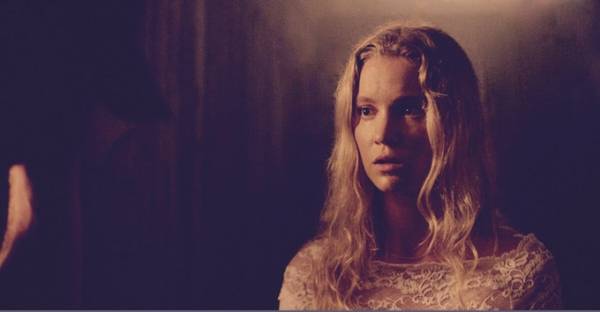
SARAH RICH IN #LIKE
Teen vendetta
The peaceful upstate New York town of Woodstock in the summertime is the setting for #LIKE, a film that follows a teenage girl called Rosie, mourning the first anniversary of her younger sister Amelia's death. Rosie discovers that the mysterious man who may have sexploited and bullied her sister into committing suicide is back online trolling for new victims. After the local police refuse to help, she takes matters into her own hands. Her vindictive anger leads her to discover, as the blurb puts it, "a darker side she never knew she had as she takes justice into her own hands."
Writer-director Sarah Pirozek declared on her Kickstarter page that she had "decided to make an unapologetically kickass feminist film." Working as a successful editor of TV commercials, Pirozek says she sought to create "powerful and positive images of women instead of the caricatures that populated the screens." She encountered a study showing that "84% of the directors working on TV shows were white men." So she decided "to make a commercial, genre, micro-budget thriller, with a nuanced female lead, telling an important story." "The film stars Marc Menchaca ('Ozark'/'Homeland'/'She's Lost Control')" she writes, "and introduces a stunning new talent, Sarah Rich, both of whom gave performances of a lifetime."
Pirozek believes herself to have made a feminist film - elsewhere called a "noir feminist thriller" - but #LIKE reads more like a creepy revenge flick - one that moves at a snails's pace. It may qualify for some oddball midnight genre venues, but it's hardly what you'd call "commercial." Maybe feminism in its more guerrilla motivational moments does call for depiction of one-on-one revenge against men who have offended against womanhood. But two wrongs do not make a right. In realistic terms the "heroine" is simply guilty of a crime - kidnapping and tormenting a man.
Rosie seems first misguided, then sick, and can't awaken our admiration for long. Sympathy, perhaps; but her victim evokes that feeling in equal measure: an unintended consequence of the plot is to awaken pity for the presumed malefactor. One reason for this is that his online bullying is an action hard to dramatize at best, and here it's never actually depicted. This is one of the major lacunae in the flimsy screenplay. Contrast Aneesh Chaganty's skillful plotting for last year's cyber investigation movie Searching, starring John Cho. Rosie might just as well have kidnapped some random dude off the tree lined streets.
Acknowledged as micro-budget, the film makes good, economical use of available locations and people around Woodstock, New York, where it's set, but the key scenes take place in a basement. This is where Rosie (Rich) holds a man (Menchaca) prisoner for an unspecified length of time under implausible circumstances. He may be guilty of cyber-bullying (or taunting or provoking? it's somewhat unclear) a young teen girl, Rosie's sister, who apparently committed suicide. AT least Rosie believes this. But she broaches it with the man in curiously roundabout fashion.
Rosie's action is sadistic and strange. It's difficult to understand what Pirozek is getting at. The movie is best as an expression of a young girl's rage. This seems an angry misandrist offshoot of the #MeToo movement, a negative one that may not win many new supporters. Does advocacy of the rights of women require hatred of men?
#LIKE, 90 mins., was screened for this review as part of the 2019 SF Indiefest (30 Jan.-14 Feb. 2019). This appears to be the film's premiere.
Last edited by Chris Knipp; 02-06-2019 at 09:57 AM.
-
THE AREA (David Schalliol 2018)
DAVID SCHALLIOL: THE AREA (2018)

Railroaded
In Englewood, in Chicago's predominantly black South Side, the segment from 57th Street to 61st Street is slated for elimination by the Norfolk Southern Railway for "intermodal" spaces, expanding an already large shipping yard for increasing railway freight transport - which is a good thing if it lessens the more ecologically destructive use of trucks. Nobody ever explains quite what "intermodal" means to the scattered black inhabitants of Inglewood. But the company buys the houses at cheap rates, relocates the people, knocks down the houses, clears them all away. Visual sociologist David Shalliol covers this process in The Area, his debut documentary feature, a slow, incremental film that quietly focuses on a few people. It is a portrait of poverty and race in America, the African American survival sprit, and the sadness of giving up one's longtime home, over and over again. It's also a portrait of Englewood resident and citizen activist Deborah Payne, a woman of indomitable energy and courage. She knows she cannot stop this process of relocation, but what she can do is fight to see that no one's dignity is destroyed.
This is also a portrait that shows both the strength of spirit and the economic, social, and political fragility of these same South Side residents. Deborah has a stroke and is in the hospital, but comes out and is as vigorous as ever. She is one of the last to leave. One woman complains that she was duped into not paying her mortgage for two months to enable the process to go through and then found that had damaged her of her credit for a new mortgage, so she had to become a renter. This is the fate of people who are powerless because they are poor and on top of that lack the education and knowledge to fight lawyers and bureaucratic complications. But having struggled all their lives they are also strong.
We hear about how this had become a terrible neighborhood, and there are signs of blight and already many missing houses. But it still has a quiet suburban feel, with pockets of gentility and dignity. A couple of young guys hang out together who are survivors of gang banging and shootouts. One of them, Weezy, is paralyzed from the waist down from bullet wounds but later, he leads police on a high speed chase, driving with a stick. There's indomitability in that too. The cops take their phones out to snap photos, wondering. Weezy goes to jail for three years but is out in two, relocated, as feisty as ever, but wiser.
Deborah gets a big place in an apartment building but says she asks herself if she is lonely. However she is active with a new group of "wonderful women" against sexual harassment and for breast cancer awareness, striving to stay healthy so it can "not be all about me."
These are people and another is a man of a certain age who fought to keep his mother in her house till the end because, since she had dementia, he explains that such people's souls hang by a thread, and changing their surroundings severs that thread. He was able to keep her dignity for her till the end. And then, he could let the house go. These are lessons in what maters in life.
A memorable scene is when winter comes and it snows after many of the houses have been torn down and carted away. Deborah walks around in a bright yellow winter coat talking and savoring the beauty, and sadness, of the transformed place which, garbed in snow, looks like country.
There are also city board meetings, even one with a dead-eyed Rahm Emmanuel, Mayor of Chicago, where the meaningless declarations of various officials, coming after we have thoroughly absorbed the viewpoint and situation of the Engleside residents, come dripping in unintentional irony. The politicians' ill-formed sentences don't even make sense; they're just a ritual to plaster over the inevitable and the predetermined - when you are poor.
The Area is a slow-building documentary that carries more emotional and intellectual weight that you realize at first. Toward the end especially there are long fades to black, appropriate because is this not the story of people and a place dying over and over but then slowly coming back? But the houses don't come back or the many contents lost with them, and over and over we see houses bulldozed and their residents watching and weeping.
Shalliol is also an accomplished still photographer and the film is informed by his handsome still photographs of the beautiful, doomed old wood frame and brick buildings of "The Area." His film was the biproduct of docoral studies in sociology at the University of Chicago. For further details about him and the film see an article by Andrea Gromvall in Chicago Reader.
David Schalliol slide show.
The Area, 93 mins., debuted 6 April 2018 at Full Frame Documentary Film Festival, Durham, North Carolina. It was screened for this review as part of SF Indiefest, 30 Jan.-14 Feb. 2019.
SF IndieFest: THE AREA: Upcoming Showtimes
February 10 12:30 PM SF IndieFest at the Roxie
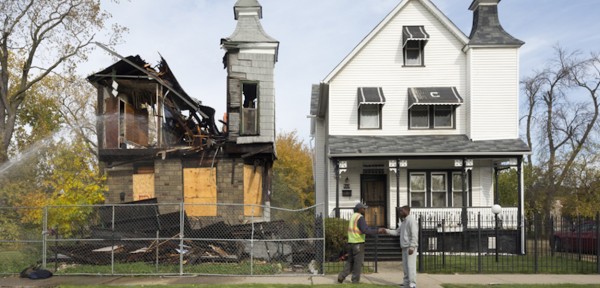
Last edited by Chris Knipp; 02-04-2019 at 01:23 AM.
-
CRUEL HEARTS (Paul Osborne 2018)
PAUL OSBORNE: CRUEL HEARTS (2018)

ALEV AYDIN AND PATRICK DAY IN CRUEL HEARTS
Mind games
This cleverly plotted little potboiler isn't very convincing but it is ingenious enough to be fun to watch and build to a tense finale. The means are minimal but with the jump-cut scene shifting style and the very devious main character, there is plenty going on. Things aren't very interesting at first. Guy (Alev Aydin) sidles up to Burt Walker (Patrick Day), a low level crime boss, at Skinny's, the bar he owns and uses to launder money for the mob. He tells him he has slept with his wife, Teri ( Bonnie Root). It's not his fault, see; she put him up to it and he had no idea she was married. Burt is furious, but, humiliated, and troubled because Terry is his pride and joy, he does little to Guy, and later says nothing to Teri. Curiously, Guy keeps coming back. He's either crazy or something funny is going on. It's the latter.
These scenes are photographed in an ugly, flat manner and the acting, particularly by the guy who plays Burt, doesn't seem very good. Things get better when Guy starts hanging out at an empty all-night diner and he and Grace (the excellent Melora Hardin) the older, but attractive waitress. get friendly and chatty. The action seems to take a break, but it's here that the story deepens and comes out with a big surprise revelation after Guy gets rid of Grace's annoying ex-, Stu (Jack Gogreve). It's then that we find out, sort of (if we can believe him) what Guy is actually all about. Later his clever but very dangerous game backfires this time in the midst of an elaborate series of ruses.
Cruel Hearts is like a short story with a noirish mood. I thought of Tarantino because I kept wanting the dialogue to be as ornate and fun as his (it's not, despite the Pulp Fiction situations), and I thought of "The Sopranos" because this is a gangster story that is largely about domestic relations. The heart of Cruel Hearts is the marital relationship between Burt and Terry. It seems they really love each other, but he distrusts her and she feels abandoned by him. In other words, they could do better. They need something or someone to shake them up, and Guy could be just the thing. There are some breathless moments - but this movie is still at its best at its still points when Guy is flirting and gabbing with Grace in the empty diner, sipping coffee. It's here that Osborne shows his real talents, which are for writing dialogue and developing character.
Cruel Hearts, 86 mins., written and directed by Osborne and his fourth feature, debuted 10 Nov. 2018 at Twin Cities Film Fest. It was screened for this review as part of the SF Indiefest (30 Jan.-14 Feb. 2019).
Last edited by Chris Knipp; 01-31-2019 at 12:46 AM.
-
DEGENERATES (Callum Crawford 2018)
CALLUM CRAWFORD: DEGENERATES (2018)

JAMES SANBROOK IN DEGENERATES
A quiet gathering of eccentrics
British writer/director/actor/producer Callum Crawford's debut feature is partly mundane, partly surreal, partly comical, and very English. It starts with the alliteratively-named young auteur's real-life situation: he couldn't sell his scripts and after five years of trying, set about to make his own film. Such is the case for Casey Vaughn (Crawford), a writer whose MSS. keep being returned to him, and he doesn't want to take pay for touching up somebody else's script. He's told by his sleazy agent Victor Moseley (Jamie Foreman) that true stories sell. So he recruits a handful of eccentric characters to go and find an actually missing teenage girl in the neighborhood who has disappeared on the way home from school. The plan is to turn what happens along the way into a script. He gathers a bit of information about the girl from going to her house and, on the spur of the moment, impersonating a police detective to the girl’s mother (Anna Acton). The lawbreaking, and the script-sculpting, begin.
What's so English is the slow, calm manner in which this risky scene unfolds. As if to pause for breath, or let us better savor the moment, early passages of Degenerates in fact seem at times on the verge of of coming to a standstill. Whether this is evidence of trouble maintaining rhythm or absurdist playfulness, we don't know yet. If we stay tuned, the film offers quiet pleasures. These start with the "characters" Victor recruits to populate his script, aide him in his search for the girl, Jane. Maureen (the excellent Annette Badland) he spots delivering a blistering reproof to an impolite toff in line at a cafe waiting a bit too impatiently for his espresso. She turns out to be a pharmacist who moonlights as a black market drug dealer. Next, sitting in a car she's about to steal, he finds Naomi (Lauren Douglin), a petty thief with a violent streak. Last he recruits a classic English type, a pale blond fifteen-year-old called Peter (James Sanbrook), a real boy scout with a bike and large binoculars. Peter, an innocent who reveals no caution about wrongdoing, acts as the lookout and team "Mascot." Victor stages a comical information session for is little gang. Then they're on their way.
Victor's notion is that these three helpers will provide "character" for his screenplay, and whatever happens will be its content. There is a convicted felon connected to the missing girl's family who becomes he prime suspect and whom they quickly track down and subdue. Mayhem ensues. It's obvious Victor, familiar with fiction and an experienced if not a successful screenwriter, possesses very little notion of the line between the real and the invented, or, more importantly, between the bold but acceptable and the totally illegal. Callum Crawford, on the other hand, seems to know quite well what he is doing, and his multiple-hyphenate performance shows a maximum of British sand-froid and drollery. Let's hope Degenerates will serve him as a good calling card toward future successes.
Degenerates, 102 mins., had its US debut at the San Diego Film Festival 11 Oct. 2018. It was screened for this review as part of the San Francisco Independent Film Festival (SF Indiefest, 30 Jan.-14 Feb. 2019).
SF IndieFest Showtime: February 7 - 7:00 PM at the Roxie
Last edited by Chris Knipp; 02-06-2019 at 09:33 AM.
-
DESOLATION CENTER (Stuart Swezey 2018)
STUART SWEZEY: DESOLATION CENTER (2018)
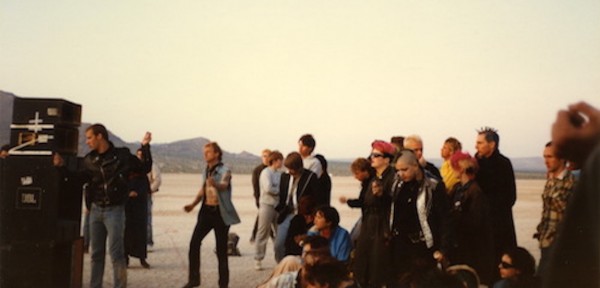
AUDIENCE FOR A DESOLATION CENTER EVENT
A time of musical adventure
The Reagan-Thatcher era of the early Eighties was a turn to to the right on both sides of the pond. But in the arts it was a time of vibrancy, experimentation, and opportunity, as I myself saw in my own career as a visual artist. It seemed like the worst time in society and politics, but the best time for art - and for me. This new documentary dramatically shows that was true for other people. Stuart Swezey, who was himself a prime organizer of pioneering punk rock desert events, has crafted a film rich in eye-popping archival footage. The punk and industrial music scene was at its peak. He and others enlivened it further by bussing adventurous young audiences, along with groups like Sonic Youth, Minutemen, Meat Puppets, Redd Kross, Einstürzende Neubauten, Mark Pauline's risk-taking Survival Research Laboratories, Savage Republic, Swans and others two hours out into the Mojave Desert to experience sound and happenings in an intimate, stark, awesome setting, without commercial distractions. Later Swezey went from sand to water and did a show of hard core Sen Pedro musicians The Minutemen, on a boat in the harbor of San Pedro. This was the hard core of what became big and commercial with events like Lollapalooza, Coachella, and Burning Man. Many of the concertgoers speak today about what were seminal and unforgettable experiences of their lives. This is an eye-opening and inspiring film.
It's funny, but even if punk rock means little to you, it's impressive how much it meant to the people whose experience is chronicled in this film. It's about the audience almost more than the bands, though it becomes clear from the testimony that these treks out into the desert meant much to the musicians too. The desolate location seemed right. It was far-out, it was rad, It was a place to be free with like minded people - and nobody else. Audience members, 20-something Angelinos, had never even been to the Mojave desert. They did have experience of being frequently hassled in bars and clubs by L.A. cops, whose police chief then, Daryl Gates, was a real piece of work, who hated punk music, hated blacks (and the punk scene was very multi-racial), hated youth, hated their having fun. Downtown L.A., by the way, at that time was like one big slum, and urban desert, so the move to the natural desert was logical, and practical.
The school buses that packed the audience out to the concerts were part of the mystique and the success. They were a solution about how to collect tickets in a venue with no walls or gates. The tickets - beautifully made ones, which contributed to the caché - were sold well in advance, and the audience members rode out to the desert on the buses, avoiding gate-crashers and contributing to the sense of togetherness.
We hear from regulars of the L.A. punk rock scene who were at these concerts, who rode in the busses, couples still together, who say this was the coolest thing they ever did, and something that cemented their relationship. It feels like, counterintuitive for this kind of music scene though this may be, these were events were healthy, inspiring, life-affirming, and wonderful fun. We're also seeing footage and stills comparing the young punk fans with their present selves, and the comparison too is positive.
After his success putting on the first desert concerts, Stuart Swezey quit his Los Angeles day job and went to Europe settling in Berlin. It was simpatico, and the punk music scene, rife with performance art, was exciting and inspiring, particularly a highly experimental group called Einstürzende Neubauten / Collapsing New Buildings. He brought this bigger band, with its industrial strength bricolaged noise to a new location, not too far from Coachella) alled Mecca. Werner Herzog'sFitzgeraldo was an inspiration, Swezey recounts. Einstürzende Neubauten brought in kindred groups to the concert, including Mark Pauline, of Survival Research Laboratories, with his thrilling and terrifying self-destructive machines - all to a location not disclosed to audience members ahead of time.
There was more focus, less distraction, than in any other venue. Compare today's pampered, low-attention-span youth with their grafted-on smart phones.
Musician Janet Housden declares now, "People in their twenties are sociopaths." They loved Mark Pauline trying to blow the side of a mountain away. That was then. They would not feel that way now. This is a statement about wild youth having its day. It's bracing, but cautionary to see footage of the "religious experience" that was the desert concert built around Einstürzende Neubauten and their American friends. The only trouble with this film is that after that explosive concert, the rest is a bit of a let-down. The only trouble with this film is that after that explosive concert, the rest may seem a bit of a let-down. Nonetheless the next featured story, of the Minutemen's San Pedro show in 1984, is significant: the Minutemen's Pedro show became their seminal album, Double Nichols on the Dime which put them on the map. Sonic Youth (discovered by Swezey in Berlin) were to come, and Gila Monster Jamboree in 1985, and concerts where people were allowed to come in their own cars, but given the final destination only along the way.
Desolation Center, 94 mins., debuted in 16 Mar. 2018 at CPH:DOX in Denmark and has shown in a dozen other festivals in 2018 and early 2019 .Originally watched by me as part of SF Indiefest. Rewatched courtesy of MATSON FILMS. It is coming to the Bay Area to the Roxie Theater San Francisco and Rialto Elmwood Sept. 20, 2019 - with Q&A's and still showing at Arclight Cinemas in Los Angeles, with Q&A's recently. For other cities, venues, and times see their website <a href="https://www.desolationcenter.com/">Desolation Center</A>.

Last edited by Chris Knipp; 09-20-2019 at 07:47 PM.
-
LITTLE WOODS (Nia LaCosta 2018)
NIA DACOSTA: LITTLE WOODS (2018)
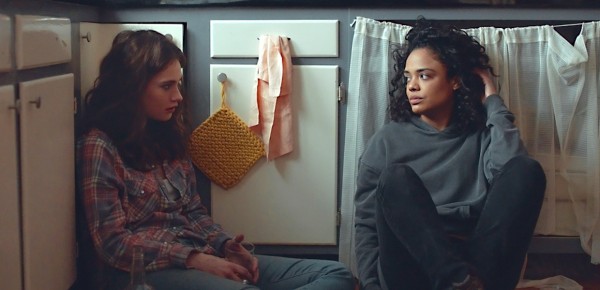
Coming soon (This is not a review)
It recounts a time of crisis (if they've ever had any other, we don't know) in the lives of two recently estranged, now reunited sisters, Ollie (Tessa Thompson) and Deb (Lily James), forced into (or back into) breaking the law to survive. The action takes place in a fictional North Dakota oil boom town. Ollie has been running prescription drugs over the Canadian border. She got in trouble for it, but her probation is about over when she has to return to it to get the money to save their house. She wants Deb, who's unexpectedly pregnant, to have the house while she takes a job out West.
This may indeed be called, as Hoai-Tran Bui does in Slashfilm, "a grim neo-Western that operates like the female response to Hell or High Water." For its focus on women pushed to crime for survival it's also been compared to Debra Granik's miserablist but finely crafted Winter's Bone.
See the Variety review by John DeFore from Tribeca (Apr. 2018), and you will see how favorably most critics reacted to this, Nia LaCosta's feature debut. A story steeped in social consciousness, it clearly pushes all the right buttons. But before comparing this too closely to Winter's Bone, one should consider that film's rich sense of place and original sketching of character. And as for Hell or High Water, with its dashing crooks, wild bank robbing, and suspenseful police track-down, is almost indecently enjoyable. Fun is thin on the ground in Little Woods.
Litle Woods, 105 mins., debuted at Tribeca Apr. 2018, showing in at least ten other festivals. It was screened here as part of SF Indiefest (Jan. 30-Feb. 14, 2019). Coming to theaters April 19.
SF INDIEFEST showtime: Fri, Feb 8 - 7:00 PM Victoria Theatre
Last edited by Chris Knipp; 02-09-2019 at 11:26 AM.
-
THE MAN WHO KILLED HITLER AND THEN THE BIGFOOT (Robert D. Krzkowski 2018)
ROBERT D. KRZKOWSKI: THE MAN WHO KILLED HITLER AND THEN THE BIGFOOT (2018)
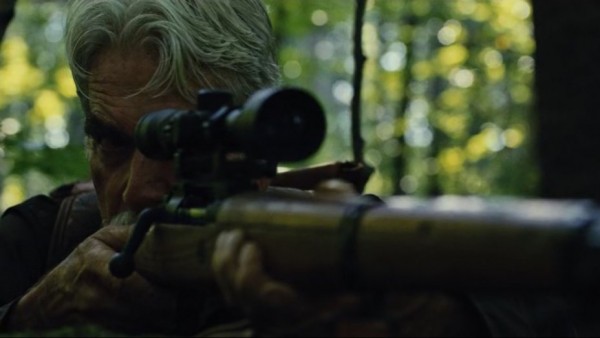
SAM ELLIOTT IN THE MAN WHO KILLED HITLER AND THEN THE BIGFOOT
Spectacular memories of an old man who still has skin in the game
It's fun rambling around in Robert D. Krzkowaki's ruminative, flash-back-ridden first feature, which is as overloaded as its title. Perhaps it's overambitious. Or perhaps it just has the flimsy panache of comic books, from which Krzkowaki coems. It focuses on a vigorous, handsome older man - that would be Sam Elliott, who's seventy-four but still has dash - who is haunted by memories. When he was young, Calvin Barr (in flashbacks played by Irish actor Aidan Turner), a man skilled at languages, went into deep cover as a Nazi officer to kill Hitler. We see it played out. Of course it didn't happen in real life, and it's a far-fetched fantasy. Now we follow Calvin Barr (played by Elliott) many years later. He downs whiskies at a bar every night, and easily wipes out a group of robbers who, trying to steal his car from him, succeed only in putting out a cigarette on his old wallet phto of a pretty girl - foreshadowing another rumination, on an old romance. Barr drives off in his big 1970's car. The year now, unspecified, must be around 1980.
Next day, Barr is alone with his trusty dog. A flashback of the assassination of Der Führer shows he had a German shepherd with him then. That's preceded by a wordy scene where a barber talks to young Barr about how drawing blood - but only if accidental - will mean good luck in his mission. He addresses young Barr as "America." In the present time, old Barr has a pebble in his shoe he can't find.
This is typical of the whole movie. The scenes are well done and for a moment each of them thoroughly draws us in. But the shifting, with the base of the swaggering, whisky-soaked and handsome oldster, establishes too little momentum. What it does is show Krzkowski as ingenious and energetic. Incidentally, The Man Who Killed Hitler doesn't overtax us much with its length, since it's only ninety-eight minutes.
"Despite excellent, committed performances from Elliott and Turner, and a few droll moments with agile comics Livingston and Manji, the film fails to engage. It veers from talky, melancholy drama to gory creature flick, and from innocent love story to swaggering war epic, as writer-director Krzykowski can't seem to nail down one cinematic style or message. Frequent flashbacks add another layer of confusion." So wrote Lisa Tsering in her recent review for Hollywood Reporter.
When old Barr is called on by the FBI to kill Bigfoot, a monster roaming Canada carrying a deadly all-slaying virus, the movie enters, through a protective ring of fire, its appealing (for fans of such) genre horror adventure phase. But it enters two thirds of the way through. A little late in the game.
SF INDIEFEST showtime: Thursday, January 31, 2019 at 7 PM – 9 PM - Roxie Theater
3117 16th St, San Francisco, Calif
Coming Soon - In theaters February 8.
Last edited by Chris Knipp; 02-08-2019 at 10:29 PM.
-
MERMAIDS AND MANATEES (Adam Zbar 2018)
ADAM ZBAR: MERMAIDS AND MANATEES (2018)
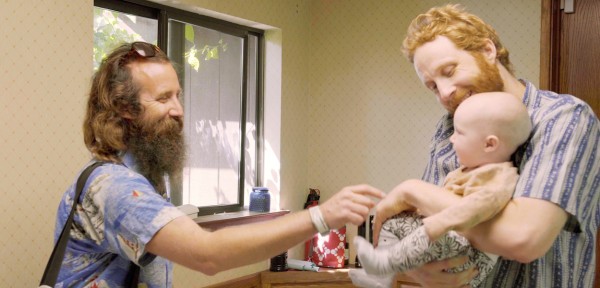
BJ AVERELL, TYLER MACNIVEN IN MERMAIDS AND MANATEES
Silicon entrepreneur parenting
Can there be such a thing as a cautionary joke? If so, this is one. It's also a play movie, the toy of two Silicon Valley entrepreneurs (Adam Zbar and Tyler MacNiven). Their premise was to make a movie about the worst thing that could happen to them. They both had young babies, so the answer was for their child to be left in irresponsible hands. Those hands are of a friend who's a failed actor. In the film he's called Benji (BJ Averell) The cautionary twist is that what prompts this irresponsible act is putting business success, AKA money, by way of meeting on a boat with some high profile investors for seven hours, over an old friend and one's own child, whom the entrepreneur-dad leaves together. Fine, but this is a one-note shaggy dog story, and as a fan of the absurdities of app entrepreneurs so wittily detailed in Mike Judge's HBO series "Silicon Valley," I expected something more substantial than this bagatelle. Call this mumblecore for millionaires: a vanity project.
Any film however frivolous has a life of its own, and so after a while we begin feeling sympathy for the failed actor. Unreliable or unstable though he is, he did come for "boy's weekend," and not to be left alone for seven hours with somebody's seven-month-old baby. He begins to seem to us like a wronged person and we feel sorry for him. And then for ourselves, to be saddled with the non-stop monologue that expresses his plight.
There is further irony (or is it just convenience?) in the fact that the director of this trifle, Adam Zbar, is a friend and business partner of Tyler MacNiven, who plays Rich, the baby's careless (and rich) father, and BJ Averell, who plays the loony actor left alone in the big house and saddled with the baby, while he gulps an impossible number of bottles of good wine, inhales an unspecified amount of choice weed, and pops a suicidal number of unknown pills, is a former friend of MacNiven's: the two competed successfully as a team in an episode of "The Amazing Race" twelve years ago.
Averell has to carry most of the short feature alone with the baby, improvising. He improvises, that is; the baby can just be a baby. Averell has some good moments, acting silly and abusing substances while performing skillful baby-wrangling. But it's a bit much to ask us to watch googoo-gaga baby talk and riffing recitations of a rhyming list of all the countries on earth (which impressed me, actually) and a song from "HMS Pinafore", and on and on and on. If he was Robin Williams maybe this would have worked. It also would have been genuinely scary. Since, funnily enough, the baby is perfectly happy through all of this - and it's a relief there is no visible child abuse going on - it's hard to feel the danger Rich's unwise decision has created as a real threat to his baby's welfare, after all. The film title is an allusion to one of Benji's many little teaching points for Brooke, the baby, which she would get a lot out of if she weren't too young to understand.
Zbar & Co. aren't particularly good at managing practical details such as how Benji deals with the pizza delivery boy if he hasn't any money or the logistics of the narrowly averted tragedy at the end and Benji's escape. There is a warbling woodwind by way of score that's a good accompaniment to Benji's goofiness, but it grows repetitive and grating when it goes on through the entire film. The film also fails to engage seriously with the real practical complications for the inexperienced of minding an infant.
Vicki Larson wrote an article in the Marin Independent Journal about the circumstances behind the making of his film from which I have drawn for this explanation. The filmmakers haven't gotten around to putting up a page for this film on IMDb yet.They're going to have to. It's theirs, and it's out there now.
Mermaids and Manatees, 70 mins., debuts at the 2019 SF Indiefest, and was screened for Indiefest for this review.
SF INDIEFEST SHOWTIMES: Sat, Feb 9 2:46 PM, Wed, Feb 13 7:01 PM ROXIE THEATER
Last edited by Chris Knipp; 02-06-2019 at 11:02 PM.
-
PERMANENT GREEN LIGHT (Dennis Cooper, Zac Farley 2018)
DENNIS COOPER, ZAC FARLEY: PERMANENT GREEN LIGHT (2018)
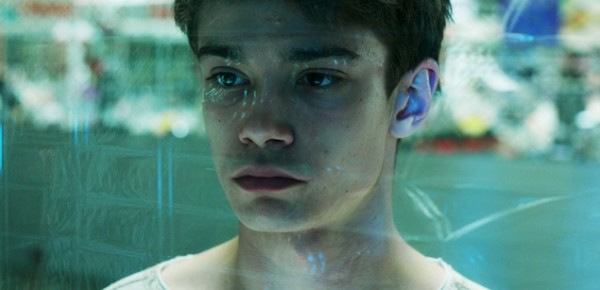
BENJAMIN SULPICE IN PERMANENT GREEN LIGHT
Self-destructive youth
A French youth in a series of quiet encounters eventually decides to blow himself up, hoping to disappear completely in a beautiful fashion.
Sixty-six-year-old California-born Dennis Cooper, best known for his 1989-2000 five-part George Miles Cycle. has been active since the Seventies. It's safe to say that his writing , which focuses on "Sexual fantasy, existentialism, death, troubled teenagers, drug use, the inadequacy of language" (Wikipedia), is both transgressive in nature, and reflects a queer sensibility. All of the young men in Permanent Green Light are good looking. The only one crush on Roman is on the part of another boy, Guillaume (Sylvain Decloitre). Cooper now collaborates with Zac Farley and since their first film in 2015 he has chosen to focus exclusively on the activity of their making films together. I thought of Grauerholz and Burroughs, though I'm not sure this comparison is relevant.
Permanent Green Light was originally inspired by the news story of an Australian youth called Jake Bilardi who joined ISIS in Syria and blew himself up, but here, the handsome youth, Roman (Benjamin Sulpice, who lives in an unspecified French suburb of stark walls and blank spaces, has no political alliance or much discernible emotion or clear sexual orientation. The style is slow, austere, intimate, with only diagetic music. I thought of Eugène Green, whose recent films have taught me the pleasures of slow cinema. I think Cooper has mentioned Bresson's Le diable, probablement, and he is a self-declared longtime admirer of Bresson, but he considers himself not a very visual person, hence the value of his collaboration with Farley - who obviously may inject some youthfulness into work that often focuses on adolescent boys.
This is an austere and elegant work that rewards careful attention and repeated viewings. I was as fascinated by it as I was put off by it, somewhat like its attractive protagonist, who is something of a cock teaser. Roman sends his best friend Ollie (Julien Fayeulle) to a fair alone, and we next see Ollie at the fair with his face streaming with tears. Another friend suggests they get high together and Roman asks just to take the drugs home to use by himself.
Scenes involving a collapsed building, a piñata, a suicide vest, and a purveyor of explosives gradually lead to Roman's radical self-annihilating act. Along the way, three other young people do away with themselves, who Roman is aware of.
See the review by Shame Khanna in TheWhiteReview. Cooper describes the film himself in Artforum, where he is a contributing editor. He and his young collaborator Zac Farley have given filmed interviews discussing their first film at the Festival du Film Subversif and this one at Rotterdam. There is a recent interview with them by Ezra Marcus in Interview.
"Cooper and Farley’s film follows a French teenager named Roman, who enlists a group of friends to help him blow himself up — not as an act of terrorism, nor out of suicidal despair, but simply because he wants to die in a large spectacle that leaves no trace of himself behind.
"What follows is an extraordinarily quiet and thoughtful movie, steeped in the culture and feeling of childhood and adolescence, as well as a highly successful collaboration."- Daniel Felsenthal, Los Angeles Review of Books. It was #10 on John Waters' ten favorite films of 2018 list announced in Filmforum.
Permanent Green Light,, 91 mins., debuted 27 Jan. 2018 at Rotterdam, showing in Oct. 2018 at Queer Porto. It was screened for this review as part of SF Indiefest. Showtimes below.
* Feb. 3, 9:30 pm: San Francisco @ SF IndieFest/Roxie Theater
* Feb. 4, 9:15 pm: San Francisco @ SF IndieFest/Roxie Theater
TRAILER
Last edited by Chris Knipp; 02-04-2019 at 09:09 AM.
-
PET NAMES (Carol Brandt 2018)
CAROL BRANDT: PET NAMES (2018)
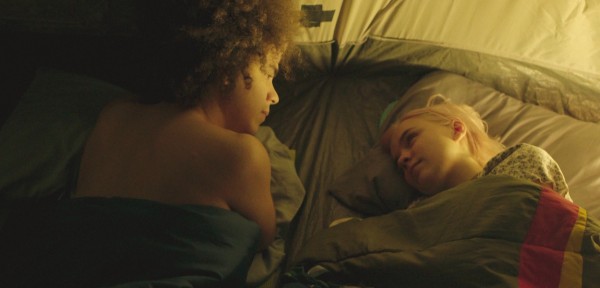
RENE CRUZ AND MEREDITH JOHNSTON IN PET NAMES
A young couple back together again briefly in an intimate gem
There are always surprises at festivals and this little gem is a big one. It's a splendid film that marks the third feature by its director and the debut of the amazing writer Meredith Johnston, who also costars brilliantly as the protagonist whose voice she, obviously, perfectly incarnates. She is Leigh, a young woman with bleached, pink-blush hair whose clipped speech and ironies mask worry and hurt. Call this Mumblecore without the mumble: no words, not even silences are wasted. The biggest surprise is how it creeps in and touches you. On top of that, the film is really quite beautiful, with lovely cinematography of a Wisconsin park in summer (the trees, the flora, delicate greens) and a now uncommon boxy 4:3 aspect ratio images that create a claustrophobic intimacy for our unaccustomed eyes.
The premise is a laughably obvious one: a too-close brief reunion of an old couple. It is, as mentioned, summer. Leigh has a bit of cabin fever. We see her in an opening sequence wandering in a bright amusement park, but she begins the day with a cigarette out front of the family house talking to a garden ornament pink flamingo. The thing is, she has quit grad school to take care of her bedridden mother. Mom can talk normally and sit up in bed to read, but she's on a drip and tight regime of meds and we understand she's mortally ill. Johnston the writer doesn't do backstories. We learn only well along that Leigh and Cam (Rene Cruz) dated in high school and through most of college, and there's no talk of diseases, majors, or dates.
Each morning Leigh goes for a run. She runs into the tall puff-headed boy, Cam and they exchange banter. Later it seems she and her mother had long planned a camping trip and it's agreed she will go, a nurse will be arranged for the days away, and she only has to find a substitute companion. At the last minute she asks Cam, who evidently has nothing to do and says yes, but looks surprised. Why would she want to do this? How could he say no? He brings along his fat little pug dog, Goose. His big tortoise he leaves in his back yard.
Millennials do banter, but not, unless forced, emotions or straight talk. Of course I don't know this, but the dialogue in Pet Names seems so real and natural it make me fell like I've gotten a slice of this generation's most intimate life. Here "JR's" summary for the SF Indiefest: "Falling into old patterns of familiarity is easy for the duo; what’s hard is facing deep-seated wounds between them that never healed. Between losing Cam's dog, tripping on mushrooms, drunken nights by the bonfire baring their souls, making up dumb songs, and jealous arguments, the 'vacation' becomes a constant guessing game of whether or not the two will find themselves back together, or never speaking again."
The comparison to early Kelly Reichardt no doubt refers to her 2006 Old Joy; also to the fact that we may have an indie-risen genius director on our hands. Every scene seems charmed. The "old patterns of familiarity" mostly prevail. Key thing: in the park, Leigh and Cam sleep together in a very small tent side by side, not touching, not kissing. But he sleeps shirtless and his skin beckons. Later they wake up lying arm in arm. A little caress in this warm Wisconsin night closeness is probably the most intimate and heartbreakingly touching thing I'll see all year. The dumb song is indeed awful. But to make up for it Leigh does an a cappella rendition of "Saint James Infirmary" that's haunting and lovely.
They play pickup games underlining that they're no longer a couple (I guess). At a rest stop enroute they think he's caught a girl's eye when it turns out she was eyeing Leigh. Losing Goose for a while looks like the movie's manufactured crisis. It soon ends but reconnects Cam with two girls, one of whom is cute. His leaving Leigh to hang out with them one morning leaving Leigh to wake up alone is the real sticking point that finally brings out Leigh's, then Cam's, well-kept pain: "You wrecked me," she says. The magic of the mushrooms and the whiskey, the soft greenery and sweet quiet and tent is suddenly shattered and they have to go back home. The suspended idyl and its shattering may not seem much but it's a lot, and of course nothing is "resolved," but this moving chain of tremendous trifles provides the satisfaction of art and kind of cauterizes the pain. Some who've written about Pet Names, though, say it's about facing death.
If you were at the SF Indiefest today, February 5th 2019, I'd say rush to the Roxie theater to savor its lovely smallness on the big screen. But I have good news for everyone: Pet Names is available on Amazon Prime any time, anywhere.
SF INDIEFEST showtime: Tue, Feb 5 9:15 PM Roxie Theatre
Pet Names, 75 mins., debuted 10 Mar. 2018 at SXSW (Austin), showing also at Mill Valley in Oct. 2018 at Mill Valley and Philadelphia and 10 Jan. 2019 at Rotterdam. It was screened for this review as part of SF Indiefest (5 Feb. 2019). It has received numerous favorable reviews, including ones by Sheri Linden in Hollywood Reporter and in The Playlist by Andrew Crump.
INTERVIEW
TRAILER
Last edited by Chris Knipp; 02-07-2019 at 10:52 PM.
-
WATERLILY TIGER (Melora Walters 2018)
MELORA WALTERS: WATERLILY JAGUAR (2018)

JAMES LE GROS IN WATERLILY TIGER
James LeGros as a slick writer bored with his success
Bob (James LeGros), a writer in Los Angeles, is shutting down in this first feature directed by the busy actress Melora Walters, whose ninety-nine credits include Magnolia and Boogie Nights and who has the support of Paul Thomas Anderson as executive producer here. As the opening title appears, Bob is being feted for something at a rich lady's house full of "wonderful art", an experience he likens to his wife to an "endless colonoscopy." His British agent Bill (Dominic Monaghan)congratulates him; his wife Helen (Mira Sorvino)comforts him. Why the ceaseless tinkly Bach piano in the background, we don't know. Music for a colonoscopy? Next morning he grumpily orders his overdressed, uppity (and entirely too sexy) lady assistant Will (Stacey Oristano) to investigate a cave man era Tar Pit hologram lady he learned about at the party. Material for some edgy, hallucinatory new writing? "Waterlily jaguar" are words he spins by a pool musing on the Tar Pit lady, which eventually become the title of the new novel. "This is the book I've always wanted to write," he says."Finally some literature. Something that will come out of me." Oh gosh! We know that's not going to go well. Now the tinkly piano music is Chopin.
Bob has made himself and others rich writing his bestselling novels of the "airport" variety, successful potboilers. The success is attested by his posh appearance and spacious surroundings. I remember LeGros best as Matt Dillon's doofus sidekick in Gus van Sant's Drugstore Cowboy (where it was Dillon who was the "Bob"). LeGros is a veteran of a great many widely different roles, the consummate character actor. The giant leap from villainous retard to slick writer is a big one that he seems to make with perfect ease. Bob is a milder fellow than the hype for this movie, which speaks of a "spiral of obsession," would have us believe. It's partly a meltdown, partly a mid-life crisis, and evidently fueled by years of too much drinking, which those near him want to stop. So he does stop, more or less.
There is confusion, certainly, lack of communication. We feel a twinge of pity for the bestselling author who wants to go quirky and offbeat. But what a nice house he has, and that classic Porsche! And he has "families to support."
After the Tar Pit visit choppy editing tells us Bob's had a mental breakdown. That's when his wife puts him on a kind of cure, special diet, no alcohol, and a shrink. He writes poetry: his new novel is in verse. It's beautiful," says Will, admiring now. The tinkly piano music turns to what sounds like Eric Satie. And now we learn that Bill, though married, sleeps with Will. And by the way, the worried Helen is a painter,with a flirtatious gallerist, who's in love with her, Jackson, is played by Christopher Backus, Sorvino's longtime real-life husband. They have a conversation in a gallery that I can't make heads nor tails of.
The accoutrements of this movie are fine, the cast is good, but the theme is a tricky one to put over to begin with, and with the irrelevant affair of Bill and Will, things go astray. Partly Walters wants them to. But what is she getting at? It's not a good sign that the basic theme is being stated all over again, and fully for the first time, in a scene between Bob and his agent, two thirds of the way through the movie. But what's clear is that nobody supports Bob in his new direction. Are they right? Who knows? Come to the last night of the SF Indiefest, at the Roxie Theater, and decide for yourself.
SF IndieFest: Waterlily Jaguar: Upcoming Showtimes
February 14 7:00 PM SF IndieFest at the Roxie
Waterlily Tiger, an admirably slim 87 minutes, was the opening night film of the DTLA (Downtown Los Angeles) Film Festival last October, and is to be the closing night film at SF Indiefest, in connection with which it was screened for this review.
Last edited by Chris Knipp; 02-04-2019 at 11:42 PM.
-
WILDLAND (Alex Jablonski, Kahlil Hudson 2018)
ALEX JABLONSKI, KAHLIL HUDSON: WILDLAND (2018)
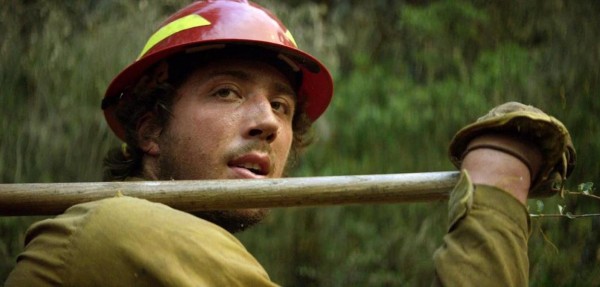
A YOUNG FIREFIGHTER IN WILDLAND
A baptism of fire and service
Joblonski and Hudson made a documentary about fighting forest wildfires. This could not be more timely, since global warming is producing the largest land fires in American history and last year the largest wildfire yet raged in California, where there are the biggest ones, entirely destroying the town of Paradise, in Butte County, in the Sierra Nevada foothills, and wiping out houses and killing people in the south too, including Malibu.
The film is not a spectacular survey, though, but a quiet, intimate study of a small team of firefighters. Technically they are a Type II Initial Attack handcrew based in southern Oregon. It stays with the single team for a season, then another, through screening, hiring, training, and work. Most of them are young, as they need to be, since the job is a matter of twelve and sixteen hour days, or worse, backbreaking work. They have a tough, experienced instructor, Tim, who quotes: "Fighting fire is just long hours of hard, boring work punctuated by moments of sheer terror."
I don't think we see the terror. What we see is boredom and disappointment, followed by excitement when they're sent to California to fight the big one, at last, then more boredom, perhaps exhaustion, but, in the end, exhilaration and a sense of having done something about as worthwhile as anything you could do. At first we see only digging row after row of connected trenches and they don't even see smoke. Then in California eventually they are on hillsides rimmed with fire, the flames are approaching them and they are choking from the smoke and we say, "Oh my God!" This is really dangerous. You can die.
Many of the crew members are first-timers. A number of them have just gotten out of jail. They are alone, or with families. They're young, mostly or sometimes middle-aged. (One guy says this is probably his last time: his body can't take it any longer. And we worry. But nobody falters.) I couldn't help it: the line, "Toughest job you'll ever love" occurred to me, along with the sense that this is really something special to do. The literature about the film describes the crew as "working-class men." But the film follows one of the young guys home, one of two, Charlie and Aiden, who joined together after dropping out of bible college. His family house is large: he comes from wealth.
The crew members are not doing this for the lack of anything better, then, but sometimes they join for an adventure, a challenge, for something real, for a coming of age experience, for a sense of redemption, to get completely away, to banish depression. At least one is a recovering addict. All are seeking a tempering and purification. But the film's aim is twofold. It means to show us the men in some depth, as individuals. But of course it's about fighting forest fires. It shows that in detail on the ground. But there's no "big picture" here, despite a few excerpts from daily news broadcasts about fires. What we do get is a sense that the crew members are performing well as a team and that they have made a contribution. After a while it also becomes true that the filmmakers and photographers are imbedded with the team. They became firefighters themselves and shared the risk when they were plunged into the heart of the California fire and at one point are hemmed in for a while, with no escape. “We actually became firefighters to make this film," Jablonski. said in an interview: "If we were going to do this story right, we needed to experience it with these guys, and just be there all the time." Jablonski and Hudson and those who worked with them paid their dues, and Wildland is admirable for its simplicity and authenticity. You feel that throughout in a film that is as visceral as it is unpretentious.
See full article at Filmmaker Magazine_Director Interviews »
This film was presented in one-hour form on PBS’s Independent Lens series. The full eighty-minute form is being shown in festivals and select theaters. It was screened for this review as part of the 2019 SF INDIEFEST.
Showtimes:
Fri, Feb 8 - 5:01 PM Roxie Theatre
Sat, Feb 9 12:30 PM Roxie Theatre
Last edited by Chris Knipp; 02-08-2019 at 08:00 PM.
-
CENTERLINE (Takumi Shimumkai 2018)
TAKUMI SHIMUMKAI: CENTERLINE
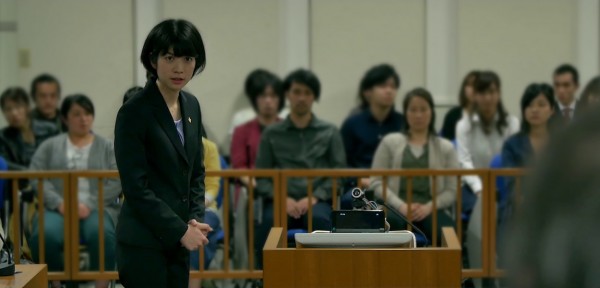
Artificial intelligence on trial in a slightly futuristic Japan
Due to the development of self-driving AI, traffic accidents are drastically decreased in 2027. Amane Yonago, a new Prosecutor, is assigned to the Transportation Division. Unhappy with her new job, she decides to indict the self-driving car's AI which crossed the center line in error and caused an accident. The instant the trial begins, the AI admits that they killed the victim on purpose. Because of this allegation, Amane Yonago must find a way to prove the AI has feelings. -JM (Indiefest blurb).
This is a fascinating and timely idea. Especially fans of Asian sci-fi and of Japanese film will enjoy it. I got a bit lost in the relatively dry details of the trial, however.
SF INDIEFEST SHOWTIMES:
Sun, Feb 10
2:45 PM Roxie TheatreBuy Tickets
Mon, Feb 11
7:01 PM Roxie TheatreBuy Tickets
Last edited by Chris Knipp; 02-06-2019 at 09:55 AM.
 Posting Permissions
Posting Permissions
- You may not post new threads
- You may not post replies
- You may not post attachments
- You may not edit your posts
-
Forum Rules





 Reply With Quote
Reply With Quote















Bookmarks